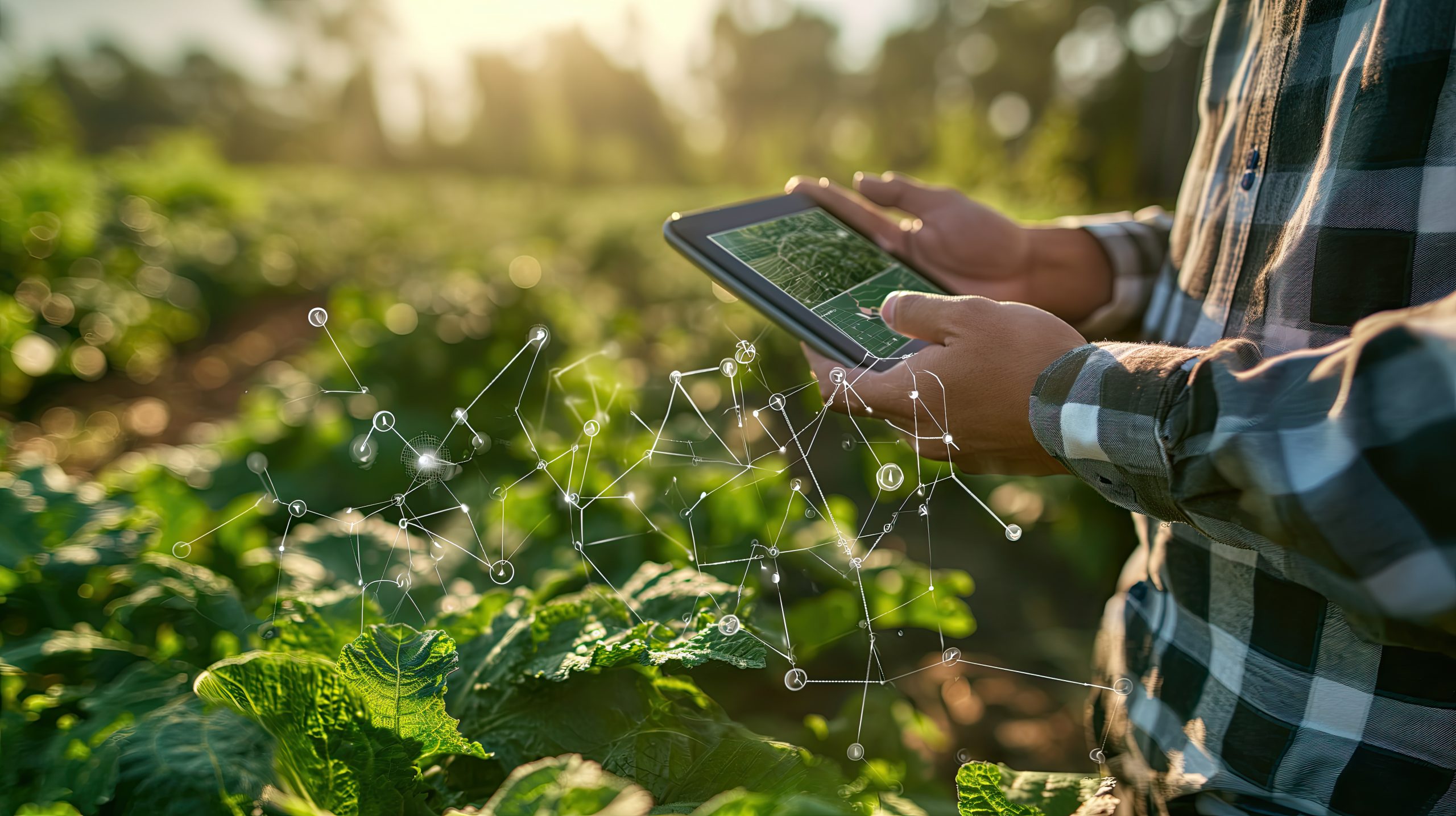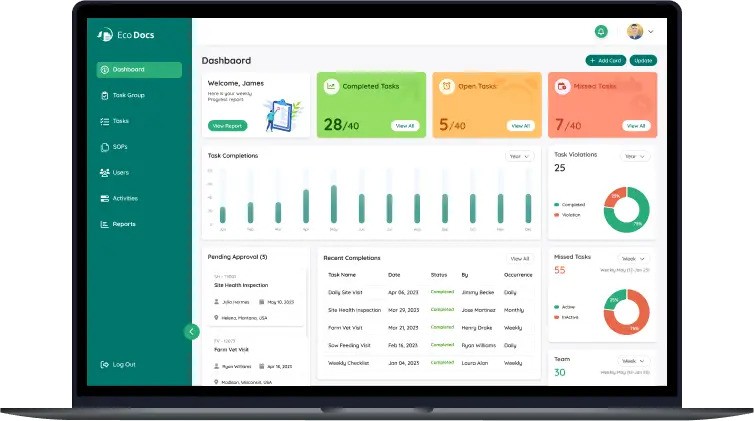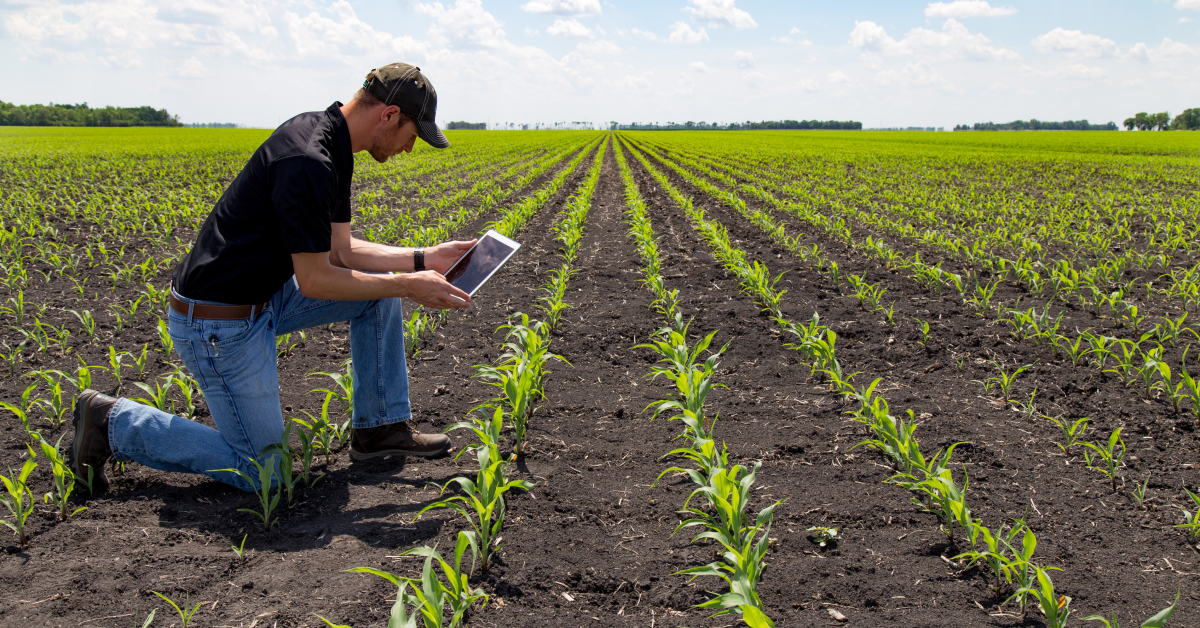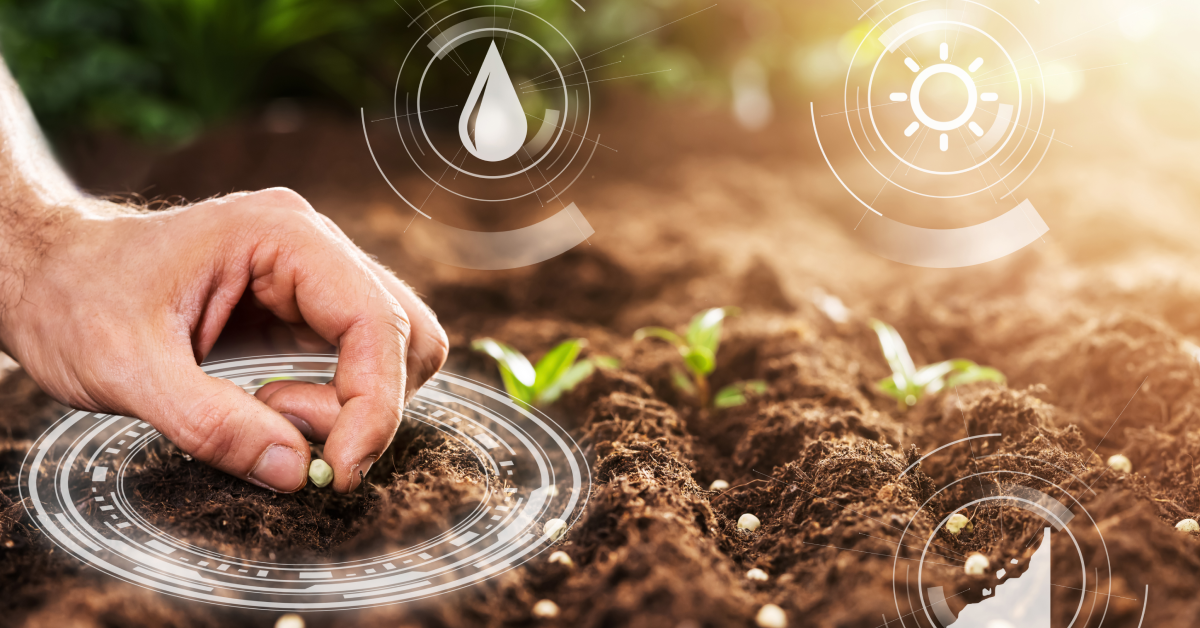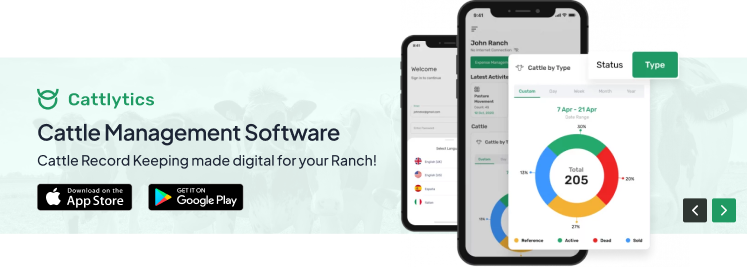As technology continues to reshape various fields, modern-day farmers seek ways to leverage this technology to improve their agricultural operations.
Whether you’re a small-scale farmer or managing a vast agricultural business, an ideal farm management solution can significantly improve your management practices.
In this blog, we will discuss the benefits of using farm management software and highlight the top ten best options for seasoned agriculturalists as well as those entering this field for the first time.
Types of Software for Farming and Agriculture
Different types of software can be used in agriculture. Each of them carries unique features and benefits. This section will discuss some of the most common types of software used in the industry.
Agriculture or Farm Branding Software:
With AI-powered agriculture or farm logo design software, farmers can leverage intelligent design tools to create professional brands, websites, merchandise, and more, enabling them to establish a distinct brand identity for their farms.
Crop Management Software:
Manage and optimize crop farming tasks, including planting, irrigation, pest control, and yield monitoring with efficient crop management software.
Livestock Management Software:
Facilitates ranchers with livestock management software to record, manage, and track information about their livestock animals from birth until they are slaughtered and sold to the end consumer.
Precision Agriculture Software:
It allows farmers to optimize field-level management and helps to track, manage, and maximize crop yields and revenues while preserving resources.
Financial Management Software:
Through this software, farmers can track their expenses and make financial plans, which helps them achieve economic sustainability in their business.
Weather Monitoring Software:
Integrates data from sensors and weather stations to provide real-time weather data to help farmers make informed decisions.
Record-Keeping Software:
It helps eliminate paper-based, inefficient record-keeping and offers real-time access to data, making it easy to manage current records or extract historical data.
Supply Chain Management Software:
Optimizes the movement of agricultural products from farm to consumer, enhancing logistics and distribution efficiency.
Labor Management Software:
Assists in organizing and tracking labor activities, ensuring efficient workforce management during critical farming phases.
Farm Management ERP:
Offers comprehensive solutions for overall farm management, integrating functions such as inventory management, human resources, financials, and more into a single solution.
Top 10 Highest-Rated Farm Management Solutions in 2024
Whether you are a rancher who manages cattle at a farm or a farmer who produces and supplies crops worldwide, using software to manage day-to-day tasks can help you improve your operations.
Here’s a list of the top ten farm management software you can use:
1. Ecodocs
Why Did We Pick It?
Ecodocs offers comprehensive CMMS capabilities tailored to different agricultural needs. It automates maintenance tasks to ensure accurate data collection. Alerts or emails facilitate real-time analysis and swift action. The software’s user-friendly interface simplifies organization, scheduling, and tracking of quality, compliance, and maintenance work orders.
EcoDocs enhances asset efficiency and reduces costs with preventive maintenance. It also functions as a strategic business tool for farmers. It excels in managing various farm types: crop production, cattle farms, aquaculture, dairy farms, hatcheries, and forestry/logging operations. EcoDocs is versatile, with automation features and analytics that make it indispensable for maximizing output and productivity across the agricultural spectrum.
Who Is It For?
EcoDocs is designed for a broad spectrum of farming operations. Its versatile CMMS capabilities make it ideal for breeders, feedlot operators, cow-calf operators, beef packers, aquaculture farmers, dairy operators, hatchery managers, and forestry professionals.
With features tailored to each sector, EcoDocs is an essential tool for automating maintenance tasks, optimizing productivity, and achieving real-time insights across various agricultural domains.
Pros:
- Versatility across sectors
- Automated maintenance tasks
- Real-time insights
- User-friendly interface
Cons:
- Initial setup time
- Customization complexity
- Upfront cost concern
2. Farm Brite
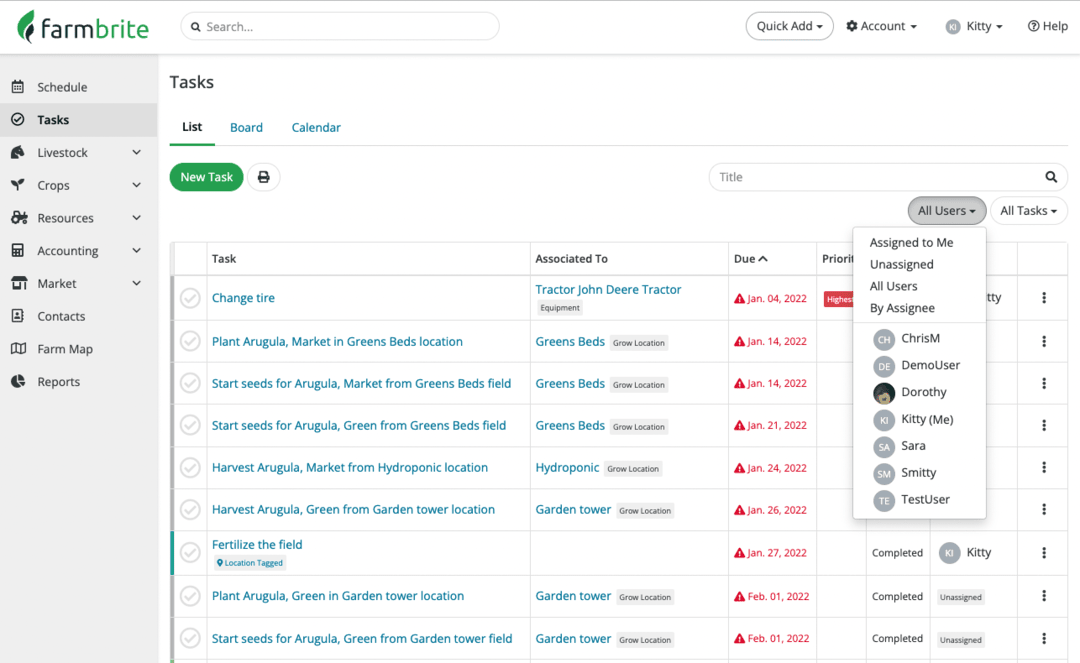
Why Did We Pick It?
Farmbrite is tailored for multi-species and biodiverse farms. Its comprehensive features include livestock management, farm mapping, breeding, health tracking, and sales. The platform seamlessly integrates operations, offering actionable insights, financial reporting, and compliance tracking. With tools supporting regenerative agriculture, it enhances soil and livestock health. The e-commerce platform simplifies marketing and sales from seed to sale.
Farmbrite’s user-friendly interface eliminates the need for extensive training, while robust farm and financial tools streamline tasks and reporting. It is a top-rated, all-in-one solution that facilitates successful farming ventures.
Who Is It For?
Farmbrite caters to farmers seeking seamless integration of functions, from planning and tracking to sales and compliance reporting. Whether cattle management, sheep, poultry, or diverse crops, Farmbrite is ideal for those who value simplicity, actionable insights, and tools supporting regenerative agriculture.
Pros:
- Easy-to-use
- Affordable
- Great data tracking
- Customer support
Cons:
- Limited customization
- Limited reporting
3. Crop Tracker
![]()
Why Did We Pick It?
Croptracker falls under the top ten farm management software list due to its cutting-edge Harvest Quality Vision technology, enabling growers to assess produce size and quality accurately. Since 2006, the platform has collaborated closely with growers, ensuring the prioritization of features aligned with users’ needs.
The software enhances productivity through cloud-based accessibility, real-time workforce connectivity, and streamlined record-keeping for spray, harvest, and irrigation activities. With over 50 reports and robust traceability features, Croptracker simplifies progress tracking, accelerates auditing, and ensures food safety compliance requirements.
Who Is It For?
Croptracker is designed for fruit and vegetable growers, packers, cooperatives, and associations of all sizes seeking efficient farm management.
Pros:
- Easy to use
- Comprehensive features
- Data-driven insights
- Traceability
- Mobile Accessibility
Cons:
- Cost
- Technical issues
- Limited integrations
- Customer support
4. AgriWebb
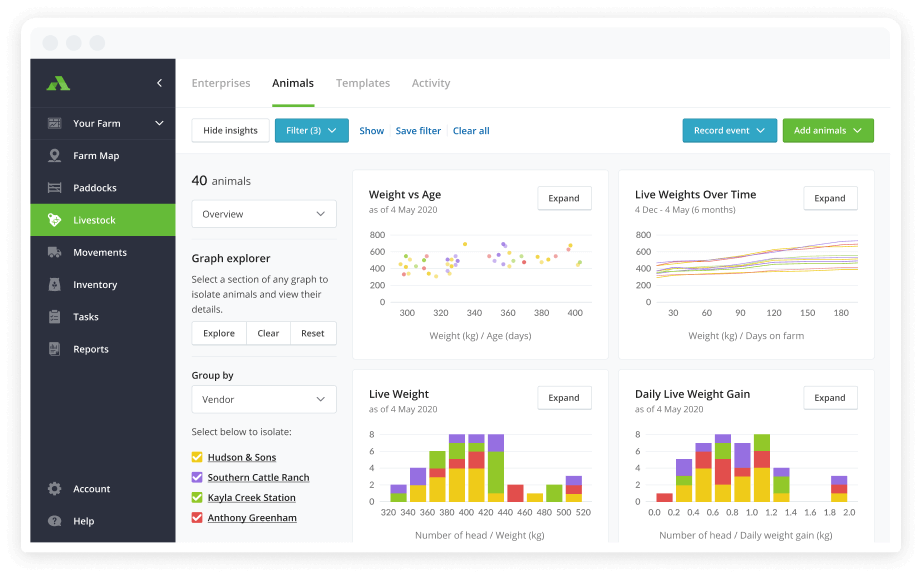
Why Did We Pick It?
AgriWebb is a powerful software for farmers that is simple to use and caters to all businesses. AgriWebb is a straightforward software for farming that promises to advance cattle and sheep production by ensuring profitability and sustainability along the whole supply chain. The software has a sophisticated biosecurity feature that aids users in documenting and keeping track of all activity. It also provides a comprehensive tool for producing reports to fulfill audit requirements.
Who Is It For?
AgriWebb’s software is designed for farmers and agricultural businesses. It caters to livestock and crop producers, offering tools for cattle record-keeping, inventory management, and livestock monitoring.
Pros:
- Data insights and analytics
- Streamlined workflow and team collaboration
- Mobile app accessibility
- Integrations and partnerships
Cons:
- Pricing structure
- Limited crop management features
- Offline functionality limitations
5. AgriERP
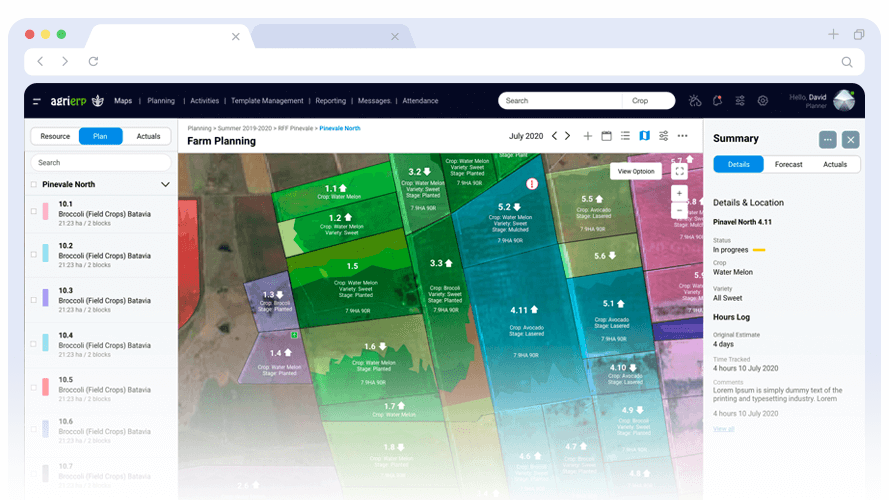
Why Did We Pick It?
AgriERP is the premier software for farmers that offers an all-in-one solution for the agriculture industry. Its comprehensive modules cover crop planning, harvest, and the production lifecycle.
Powered by Microsoft Dynamics 365 Finance & Supply Chain, AgriERP provides a user-friendly interface for efficient day-to-day operations. Its Farm, Crop, Pack, and Ship modules address every aspect of agriculture, from plantation and soil management to transportation and consignment traceability.
Who Is It For?
AgriERP is designed for Agriculture, Food, Livestock, and Fresh Produce Companies, offering a top-tier Farm Management. It caters to businesses aiming to streamline crop planning, harvest, and production operations. With modules encompassing soil sampling to consignment traceability, AgriERP is the preferred choice for organizations seeking a holistic and efficient approach to managing their agriculture-related activities.
Pros:
- Comprehensive Functionality
- User-Friendly Interface
- Microsoft Dynamics Integration
- End-to-End Solution
- Detailed Support and Training
Cons:
- High Implementation Cost
- Complex for Small Farms
- Integration Challenges
6. Trimble
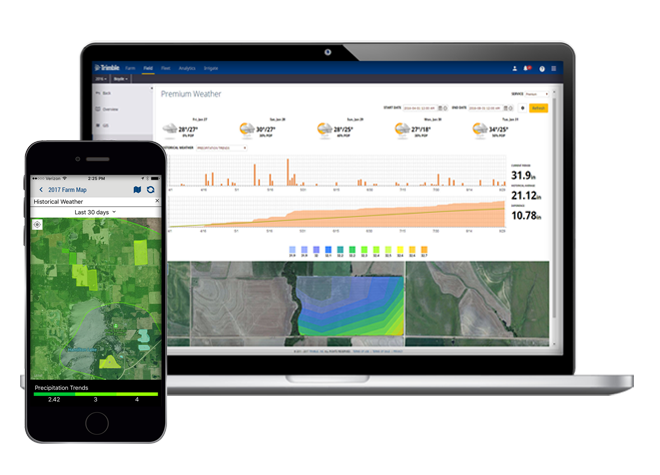
Why Did We Pick It?
Trimble Ag Software excels in automating critical workflows for farmers, retailers, and companies. It is famous for saving essential time and reducing human error through automation. It is the only fully integrated mobile, desktop, and cloud software that is the easiest to operate and is available 24/7, anytime and anywhere. This is why it is celebrated even in the eyes of farmers who do not live in the upper status quo.
Who Is It For?
Trimble’s farm management software is designed for agricultural professionals, including farmers, agronomists, and agribusinesses.
Pros:
- Precision agriculture capabilities
- Data-driven decision-making
- Scalability and customization
- User-friendly interface and good support
Cons:
- Complex features
- Integration challenges
- Reliance on technology; Data privacy concerns
7. Granular
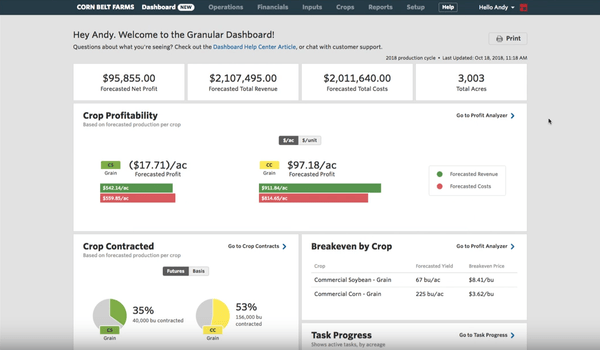
Why Did We Pick It?
Granular offers a real-time, all-encompassing system that optimizes decision-making for increased efficiency and profitability. Eliminating spreadsheet hassles provides seamless data organization. Granular facilitates communication through work orders, ensuring clear task directives and enhancing collaboration between farm managers and operators. The software’s predictive analytics aids in crop and field planning, optimizing water usage and climate considerations.
Granular provides farmers with a complete crop history for the past five years, including crop rotation information. Through this data, farmers can make strategic planting decisions and maximize revenue. Granular’s mobile accessibility streamlines task management, providing real-time updates and eliminating paperwork.
Who Is It For?
Granular is specifically designed for farmers who want to streamline operations, overcome spreadsheet complexities, and optimize decision-making for increased efficiency and profitability. It is tailored for farm managers and operators who prioritize clear communication, efficient task management, and a comprehensive platform for real-time organization and analysis.
Pros:
- Informed Decision-Making
- Customized Reports
- Consolidated Records
- User-Friendly Mobile App
Cons:
- Inflexible with workarounds
- Challenging to learn the financial aspect
- The grain inventory function is worthless
8. Farmlogs
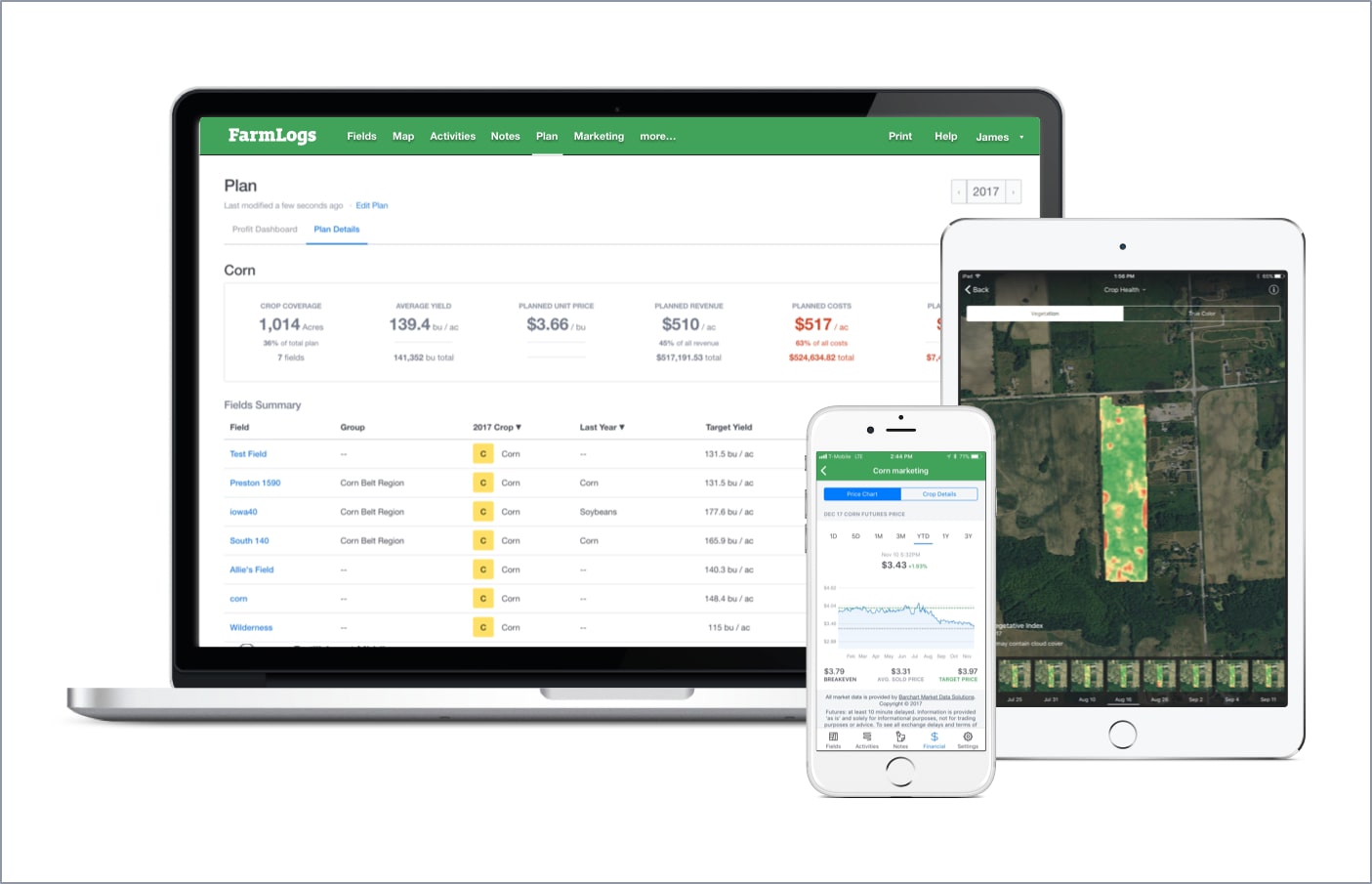
Why Did We Pick It?
This agricultural software is by far known as the most accessible and most comprehensive open-source farm management software due to the convenience it gives to its users. It is smart, informative, and easy to use, even for farmers not skilled at handling digital technology.
It provides its users with timely and accurate information that could aid in more productivity output, less waste, and maximize profit in the long run by storing data in logs that are easy to handle. Also, its records can easily be accessed on Android, desktop, or iOS devices.
Who Is It For?
FarmLogs software is primarily designed for farmers, agricultural professionals, and others in the farm sector who want to manage and monitor their farming operations more efficiently.
Pros:
- Crop planning
- Resource management
- Weather integration
- Data-driven decisions
Cons:
- Internet dependency
- Limited customizations
- Tech infrastructure
9. Agrivi
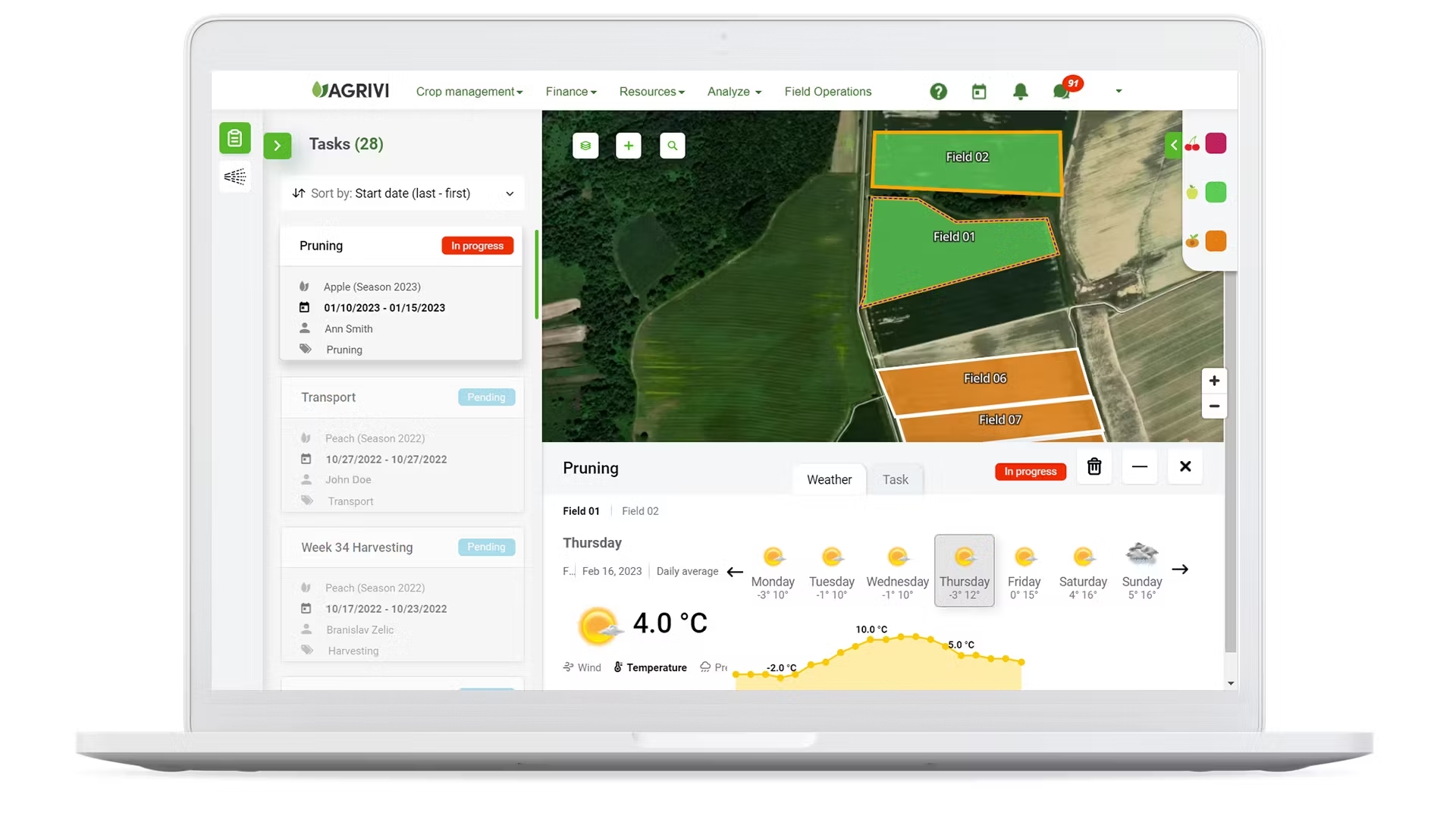
Why Did We Pick It?
Agrivi is one of the farming software that helps farmers plan, maintain, and analyze all farm activities, including financial conditions and workforce balance.
Agrivi is renowned for its unfaltering performance and effectiveness. It is considered the most reliable software for farmers of every nature and social strata, helping them derive data-driven decisions to increase their farm’s productivity and profit. It provides knowledge-based farm management solutions that target businessmen and stakeholders of the agricultural world.
Who Is It For?
Agrivi is designed for individual farmers, large agricultural enterprises, agribusiness consultants, cooperatives, and researchers seeking to optimize crop management, inventory tracking, financial planning, and overall efficiency of farming practices.
Pros:
- Comprehensive features
- Data-driven decision-making
- Cloud-based accessibility
- Scalability
Cons:
- Dependency on Internet Connectivity
- Limited Customization
- Delays in updates and support
10. Agworld
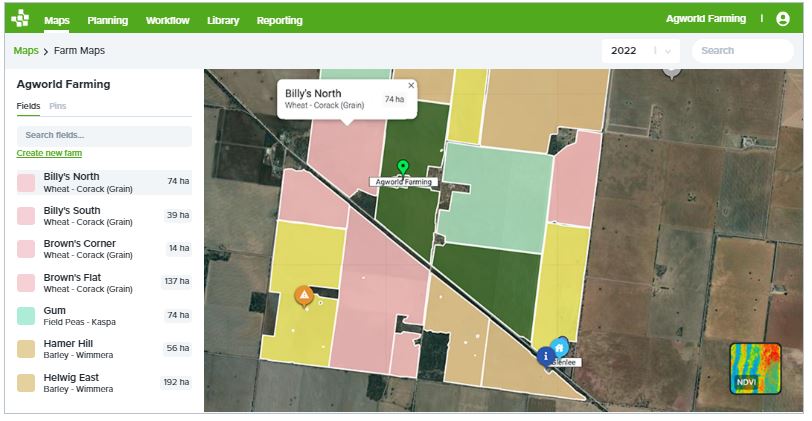
Why Did We Pick It?
Agworld is known for its comprehensive data management ecosystem. It connects growers, agronomists, and stakeholders, turning historical records into actionable insights. Cloud storage simplifies data access, encouraging seamless collaboration among team members. Agworld facilitates quick information retrieval and promotes real-time updates to reduce errors. It simplifies precise record-keeping, from seeding rates to applications. The platform caters to agribusiness advisors with sophisticated tools, including grower engagement features and precision agronomy for efficient scouting.
Who Is It For?
Agworld is designed for growers, agronomists, retailers, and agricultural service providers. It caters to various stakeholders, including farmhands, input providers, contractors, soil samplers, banks, accountants, and landowners.
Pros:
- User-friendly interface
- Good customer service
- Mobile Accessibility
- Efficient for generating work orders
Cons:
- Integration challenges with billing systems
- Manual yield import
- Software performance is slow.
- Security concerns regarding the hijacking of maps
How Do You Choose the Best Farm Management Software for Your Needs?
Different FMSs consist of different digital solutions to different farming problems. Each software has been developed to suit the user’s needs and benefit him in the long run. Some focus more on productivity, while others on maintenance. Others emphasize making farming more ‘convenient’ for the farmers, while some are solely wired to make information processing easier.
Therefore, once a farmer knows what areas he needs help with, choosing the most suitable software to cover all the grey areas would not be much of a hassle. These needs can include
- Developing efficient crop plans
- Tracking and measuring field activities
- Analyzing and forecasting weather conditions
- Measuring expected profits, etc.
Therefore, choosing the right software or using a blend of a few to efficiently manage activities inside and outside the farm is the key to unlocking a surplus future that pertains to a better agricultural world.
Software that uses global languages encompasses not one but various solutions to farming problems and provides the right tools to tackle more needs efficiently. It would be the best fit for a farmer who is new to the digital world of software systems.
The Future of Farm Management Software and Its Potential Impact on Farms Everywhere
Given the current status of the agricultural industry, with the inclusion of technology in even the most mundane tasks during the boom, modernization of the current typical farming culture is inevitable. Therefore, tech industries have developed different farm management software so that farmers all around the globe can also benefit from this technological paradigm shift.
The software systems aim to transition from ancient ways of monitoring and storing relevant data to modern, digital ways of optimization. Different systems use different ways of analyzing and storing information in a manner that would ultimately lead to better decision-making, better yield, and greater financial profit.
Hence, due to their efficiency and reliability, it is clear that farm management software solutions are here to stay. With their rule over the agricultural industry, a brighter future for farmers awaits, where farming and agriculture would be made easier and more convenient, and the process of food production would, undoubtedly, never see the dark again.
Conclusion
When choosing the best software for your needs, you must identify what areas of your farming business need improvement and match those needs with the features offered by different software solutions. The right software should be flexible enough to accommodate your current needs while providing room for expansion.
Whether you are looking for tools to help with data storage and analysis, monitoring activities on your farm, or financial management, there is farm management software out there with the perfect solution for you.
FAQs
FAQs
What is a Farm Management Software?
Farm management software is implemented in an agricultural operation to help businesses manage their tasks and track their crops and livestock effectively.
What are the Newest Technologies in Agriculture?
Agriculture is constantly evolving, with new trends emerging every other day. Some of the latest technologies in agriculture include precision agriculture, farm automation, vertical farming, and agri drones.
What is the Best Farm Software?
Determining the “best” farm software depends on various factors, including the specific needs of the agricultural business. To choose the best farm software for your needs, consider the type and size of farming operations, specific functionalities required, ease of use, and budget constraints.

